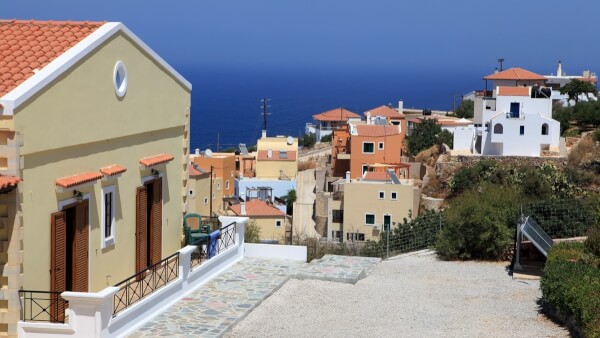How much does it cost to build a house in Poland?
How much does it cost to build a house in Poland as a UK expat? Find out in our essential guide, covering everything you need to know.

Moving to Indonesia from the UK? One of your first tasks will be to find somewhere to live, whether it’s in bustling Jakarta or the serene beaches of beautiful Bali.
You can of course rent a property, but many British expats prefer to set down roots with a property purchase - especially if they’re planning to stay a while.
But how easy is buying property in Indonesia for foreigners?
Find out everything you need to know in this comprehensive guide. We’ll look at the rules for foreign citizens, how the buying process works, fees, taxes, the latest Indonesian property prices and the pitfalls to avoid.
And if you’re looking for ways to save money on currency exchange when buying property in Indonesia, check out the money services provider Wise.
You can send large transfers with Wise for low fees* and great exchange rates - making it ideal if you’re sending a secure international transfer.
Foreign citizens are not permitted to own land outright in Indonesia. However, they can still buy the right to live in, use and even build on land for extensive periods.
This is more like buying a leasehold property in the UK, rather than having full ownership through freehold.
Under Indonesian property law, you can hold a long-term lease on a property through something called a Hak Pakai (Right to Use) title. This allows you to lease land for up to 80 years without direct ownership.¹
There are a few different options available, including:¹
There isn’t a direct route to residency in Indonesia through the purchase of real estate.
If you want to live there, you’ll need to find and apply for the appropriate visa and residence permit. The usual routes involve work, setting up a business, reuniting with family or studying.
Before you start your house hunt, it can be useful to know a little about how the process of buying property works in Indonesia.
Here’s a quick overview of the steps involved:²
Before you start searching for your dream home, it’s a good idea to get your finances in order. This means setting a budget and getting a mortgage offer in principle from a bank or other lender.
In terms of documentation, here’s what you should have ready:¹
You might also want to open an Indonesian bank account, or at least make sure you have an international account which lets you send and receive in Indonesian rupiah (IDR) without expensive currency conversion costs.
Now it’s time to start searching for your dream home. You can use online property portals and/or local estate agents to find properties. We’ll run through some tips later on how and where to start your search.
If you’ve found somewhere you like, arrange a viewing as soon as you can, and start researching the area in the meantime.
While it’s not mandatory, it’s a good idea to find and appoint a property lawyer with experience in purchasing Indonesian properties for foreign buyers.
They will help you navigate the complex rules and requirements, as well as checking over and translating all documents and contracts. Your solicitor will also carry out the required due diligence on the transaction.
A personal recommendation is a good way to find a solicitor, but you can also find a list of English-speaking property solicitors on the UK Government website.
The next important step is to submit a competitive offer to the real estate agent, or to the buyer directly. You can negotiate, just like in other countries.
If your offer is accepted, both you and the seller will sign the conditional sale agreement (CSPA). You may also be required to arrange a transfer for a deposit.
If you’re sending money from the UK, read our guide to the best UK banks for overseas transfers.
Make sure that your solicitor checks over the CSPA carefully before you sign it. You may also want to arrange a building survey at this stage, if you have any concerns over the structure.
Once any conditions in the CSPA have been carried out and a completion/closing date has been agreed upon, it’s time to sign the final sales contract.
This is done in person by both buyer and seller at the office of the Pejabat Pembuat Akta Tanah (PPAT) authority. The PPAT official will also draw up the documents for the land and arrange for the right of ownership to be registered.
You will transfer the final balance, and receive the keys to your new home.
| 💡 Read more: How to transfer large amounts of money from the UK? |
|---|
Banks in Indonesia do offer mortgages to foreign citizens. However, you might find that the conditions, rates and requirements differ compared to how it works for locals.
One important thing you will need though is a valid residence permit or visa.³
It’s a good idea to start shopping around for mortgages before starting your property search in earnest. You might want to use a broker, who can help you find the right mortgage for you. Simply having someone on your side who speaks the local language and really understands the system can pay dividends.
Alongside the property price, you also need to budget for the fees and taxes involved in your Indonesian property purchase.
Here are the essential costs you need to know about:³
| Tax/fee name | Rate/fee |
|---|---|
| Acquisition Tax (BPHTB), also known as property transfer tax | 5% of the property’s value |
| VAT - only for newly built properties | 11% |
| Notary fees | 1% or a fixed fee |
| Registration fee | Around 0.2% |
| Legal fees | 0.5% to 1.5% |
| Land and Building Tax (PBB) - annual | 0.5% a year |
Indonesia’s property market is in a pretty healthy state, and has experienced considerable growth over the last few decades.
Both property prices and demand continue to rise, especially in urban centres such as Jakarta. According to Bank Indonesia, property prices have risen by 7.5% over the last 5 years.⁴
What this means as a buyer is that you may have to pay a little more for your dream Indonesian property. You may also have to compete with other buyers, as demand is also high. There’s also the issue of high interest rates for mortgages to factor into your plans.
But the local property market is looking to be stable and growing, so it could be a good time to invest if you find the right property.
Now we come to the all important question - how much is property in Indonesia on average? This could be crucial in working out how much you can afford to spend, where you can buy and what kind of home you can get.
According to cost of living database Numbeo, the cost of buying an apartment in Indonesia is between 78% and 84% cheaper per square meter than the UK - depending whether you buy inside or outside a major city centre.⁵
Although of course, it depends on the type of home and the exact area you’re buying in.
To narrow it down a little further, here’s a guide to what you can expect to pay for an average-sized home in different cities and regions of Indonesia:⁶
| City/region | Average property price (91-150 sq.m) in IDR | Average property price in GBP (approx.) |
|---|---|---|
| Jakarta (Java) Central | 3 billion | £148,661 |
| Jakarta North | 2.9 billion | £143,706 |
| Jakarta South | 2.4 billion | £118,929 |
| Jakarta West | 2.15 billion | £106,545 |
| Jakarta East | 2 billion | £99,112 |
| Surabaya (Java) | 1.75 billion | £86,723 |
| Yogyakarta (Java) | 1.5 billion | £74,334 |
| Denpasar (Bali) | 1.75 billion | £86,723 |
| Medan (Sumatra) | 950 million | £47,074 |
| Makassar (Sulawesi) | 1.45 billion | £71,856 |
Another thing to note when figuring out the price for property in Indonesia is that international transfers could get expensive, especially if the bank or provider adds a margin to the exchange rate to convert your pounds.
Consider checking out Wise to securely handle your large transfers with mid-market exchange rates and low, transparent fees*.
According to real estate agency Exotiq, the cheapest places to buy property in Indonesia are cities like Makassar and Manado in Sulawesi.⁷ You might also be able to snap up a bargain over to the extreme west of the archipelago, in the city of Medan in Sumatra.
As you might expect, the bustling cities on Java and the tropical paradise of Bali are among the most expensive for property prices.
The two main routes to find property to buy in Indonesia are local real estate agencies and online property websites.
It isn’t necessary to use a real estate agent to find a property to buy overseas. But it can be helpful, especially if you’re moving to Indonesia from the UK and are unfamiliar with the local property market.
If it’s the first time you’ve bought a property in Indonesia, then a specialist buying agent or broker might offer helpful advice and insight into the local market.
However, there will usually be a fee to pay for this service, and you should make sure you’re clear on what you’ll get for your money.
The best way to get a head start on finding a place to buy in Indonesia is to look online yourself. Some of the most popular real estate websites for homes in Indonesia include:
One of the main things to watch out for when buying property in Indonesia, or in any foreign country, are scams.
To avoid scams and other pitfalls, make sure to get local advice and recommendations for a broker. You should also check for membership of a professional body when working with any property experts, brokers or agents.
It’s also crucial to get reliable legal advice, as property laws for foreign buyers can be complex. An experienced solicitor can help you avoid issues with unclear or disputed property titles, and help you understand exactly what you’re buying.
Other important things to remember include:
Your dream home in Indonesia will be the one that closest fits your search criteria. The most important factors are likely to be location, the type of home and of course, the listed price.
If you’re not already living in Indonesia, it’s worth making a trip to the specific town or city you’re interested in. You’ll want to check out the local area and view properties, making sure to pay attention to local transport links and amenities.
It’s a good idea to do as much research as possible before committing to purchase a property abroad.
Your solicitor will help you do your due diligence and establish the legal status of the property. But you might also want to hire a surveyor to check over the building and flag up any major issues and give you a better idea of what you’re buying.
Before you can get the keys to your new home, you’ll have a few key tasks to run through.
These include taking out insurance, setting up your utilities and carrying out any energy efficiency renovations.
It’s strongly recommended to take out a buildings insurance policy starting from your completion date. In fact, you might find it's a mandatory condition of your mortgage offer.
If you know when your completion date will be, it makes sense to get some essentials set up in advance of moving in.
A prime example is utilities, such as heating, power and water. Get these sorted as early as you can, and the moving process should be a little smoother.
If you’ve bought an older Indonesian property, you might want to make some energy efficiency improvements to it. For example, rewiring the electrics or upgrading the air conditioning system.
And that’s it - our comprehensive guide to buying property in Indonesia for foreigners.
We’ve covered all the important stuff, including the latest Indonesian property prices, how the buying process works for foreigners and what taxes and fees you’ll need to pay.
Just make sure to do your homework, work with trusted experts (especially on the legal side of things) and do your due diligence before signing documents or handing over any money.
And, if you want to save money while buying your new property in Indonesia, make sure to use the Wise account to send your international transfer. It’s not a bank account and offers customers an alternative option to a conventional bank account, but has similar features.
Here are the main benefits for using Wise: |
|---|
|
Sources used:
Sources last checked on date: 04-Dec-2024
*Please see terms of use and product availability for your region or visit Wise fees and pricing for the most up to date pricing and fee information.
This publication is provided for general information purposes and does not constitute legal, tax or other professional advice from Wise Payments Limited or its subsidiaries and its affiliates, and it is not intended as a substitute for obtaining advice from a financial advisor or any other professional.
We make no representations, warranties or guarantees, whether expressed or implied, that the content in the publication is accurate, complete or up to date.

How much does it cost to build a house in Poland as a UK expat? Find out in our essential guide, covering everything you need to know.

How much does it cost to build a house in Greece as a UK expat? Find out in our essential guide, covering everything you need to know.

Read our comprehensive guide to buying a house abroad, including how to arrange finance for overseas property purchases.

Read our roundup of 8 of the best places to buy land in the world as a Brit, looking at average land prices, buyer’s costs and more.

Read our guide to selling property in India and bringing money to the UK, covering taxes, transfer methods and other essential information.

Read our essential guide to investing in US farmland from the UK, including rules on foreign land ownership, average prices per acre, and much more.